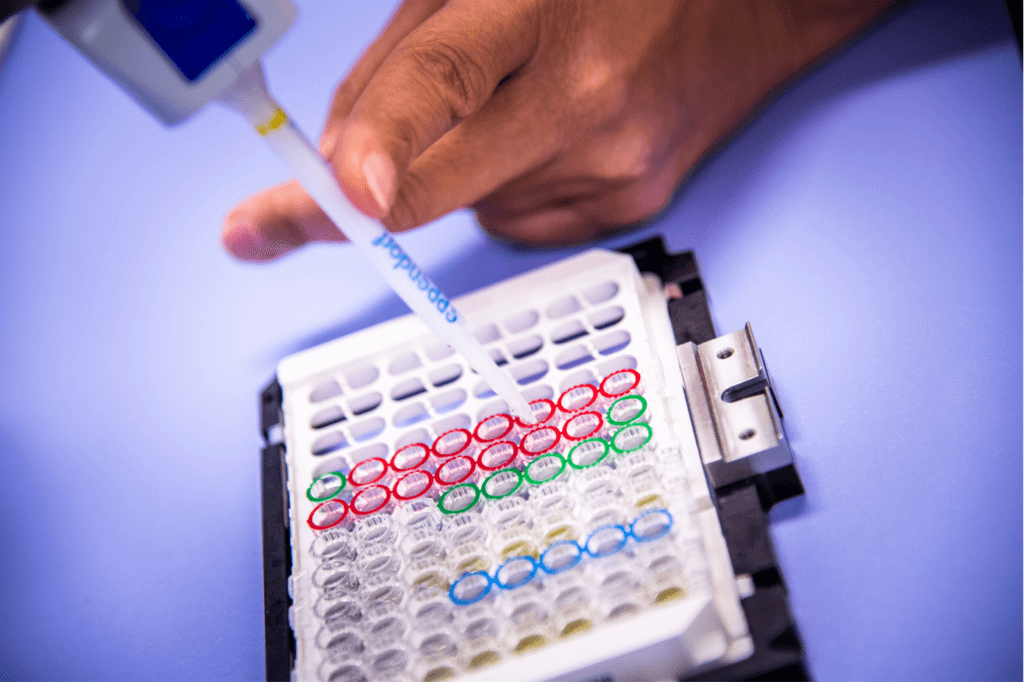Project state
closed
Project start
January 2022
Funding duration
14 months
Universities involved
UZH
Practice partners
Universitätsspital Zürich SIB Swiss Institute of Bioinformatics
Funding amount DIZH
CHF 79'000
Approximately 30% of COVID-19 patients do not recover and develop long-term symptoms (Long COVID). Based on serum immunoglobulin measurements, a prediction score was developed to calculate the individual risk of developing Long COVID. The team led by Carlo Cervia was able to introduce a novel model for the prediction of Long COVID in Zurich. The model is accessible worldwide via an online tool and has an integrated feedback loop for further monitoring.
Severe acute respiratory syndrome coronavirus 2 (SARS-CoV-2) the causative virus of the current pandemic has led to more than 670 million infections and an estimated 6.8 million deaths world-wide. Upon infection, patients can develop coronavirus disease 2019 (COVID-19) with a mild, flu-like or a severe disease course requiring hospitalization. However, after both a mild or severe acute disease course about 3-5% of individuals do not recover from their symptoms and develop long COVID. The most frequent symptoms include fatigue, breathing difficulties, and cognitive impair-ment, but multiple organs can be affected with little knowledge on pathomechanisms and risk-fac-tors.
We have identified several risk-factors of developing long COVID in a patient cohort including 215 participants. Patient age, the number of COVID-19 symptoms experienced early on, pre-existing asthma bronchiale as well as two blood biomarkers were identified as risk-factors for long COVID and validated in an external cohort of 395 COVID-19 patients. The two blood biomarkers comprise the total levels of the immunoglobulin M (IgM) and IgG3 of the patients, as a deficiency in one of the two antibodies was associated with a greater risk to develop long-term symptoms.
Supported by the rapid action call of the DIZH, we were able to successfully implement this prediction model, called PACS-score (acronym of post-acute COVID-19 syndrome). We have established an open-access online calculator (www.pacs-score.com) that can be accessed by physicians and researchers as well as interested citizens and patients. Users are able to openly access back-ground information on the identified risk-factors and can anonymously provide information required to calculate the personal risk to develop long COVID (e.g. 90% risk to develop long COVID = Very high risk). Moreover, users can provide additional information on their disease course and clinical history. Thus, a feedback loop was established to monitor how well the prediction score works in the setting of new SARS-CoV-2 variants and vaccination/treatment strategies arising. To this date, more than 430 users have calculated their personal risk score. A significant amount of feedback has yet to be established, as users can get reminded three months after their entry to provide follow-up information.
The Department of Immunology at the University Hospital Zurich was also able to implement a structured assessment of the aforementioned risk-factors in a newly established Long COVID consultation, with the aim of increasing long COVID prevention and applying different therapeutic strategies based on the identified long COVID risk-factors (e.g. targeting asthma bronchiale or immunoglobulin deficiencies). Collaborations with other long COVID consultations in Zurich were also initiated to implement routine assessment of the identified risk-factors.
Moreover, a new retrospective patient cohort was established, but not enough long COVID patients were identified for further validation of the immunoglobulin signature. Instead, we were able to deepen our understanding on underlying biological mechanisms of long COVID, possibly explaining why certain immunoglobulins are decreased in long COVID patients and how this can cause long-term symptoms.
In summary, we were able to implement the use of a novel long COVID prediction model in Zurich. Via an online tool, the model is accessed worldwide with an integrated feedback-loop for further monitoring. We were able to further advance COVID-19 and long COVID research leading to six peer-reviewed publications since funding by the DIZH.
Finally, new collaborations were established with other research groups funded by the DIZH, aiming at further supporting long COVID patients using wearables
Dr. med. Dr. sc. nat. Carlo Cervia, Universitätsspital Zürich

Publications
-
Cervia C, Zurbuchen Y, Taeschler P, Adamo S, Hasler S, Raeber ME, et al. Immunoglobulin signature predicts risk of post-acute COVID-19 syndrome. Nature Communications (2022).
doi: 10.1038/s41467-021-27797-1. [IF 17.7] -
Taeschler P*, Cervia C*, Zurbuchen Y, Hasler S, Pou C, Tan Z, et al. Autoantibodies in COVID-19 correlate with anti-viral humoral responses and distinct immune signatures. Allergy (2022).
doi: 10.1111/all.15302. [IF 14.7] -
Taeschler P*, Adamo S*, Deng Y, Cervia C, Zurbuchen Y, Chevrier S, et al. T cell recovery and evidence of persistent immune activation 12 months after severe COVID-19. Allergy (2022).
doi: 10.1111/all.15372. [IF 14.7] -
Muri J*, Cecchinato V*, Cavalli A*, Shanbhag AA, Matkovic M, Biggiogero M, et al. Anti-chemokine anti-bodies after SARS-CoV-2 infection correlate with favorable disease course. Nature Immunology (Accepted, 2023).
doi: 10.1038/s41590-023-01445-w. [IF 31.2]
Call type: 1. Rapid Action Call